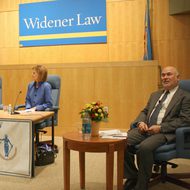“There is nothing else like it,” said senior advisor to the U.N. Foundation Gillian M. Sorensen of the United Nations at the International Law Society’s Distinguished Speaker Series event held on Wednesday, November 14th in the Ruby R. Vale Moot Courtroom on Widener Law’s Delaware campus.
“It is to me the place where realism and idealism meet,” she continued, ruminating on her belief that the United Nations is capable of reflecting both hope and political reality at the same time.
Sorensen joined U.S. Ambassador Robert T. Grey, Jr., the director of the Bipartisan Security Group, as distinguished speakers for the event. Student Kevin Krauss, the current president of the International Law Students Association, introduced Dean Linda L. Ammons, who offered a brief welcome and said, “I want to thank the International Law Society for putting this together.” Adjunct professor Jonathan Granoff, who teaches international law and served as a moderator, then introduced the two speakers.
Speaking first, Sorensen presented “The U.S. and the U.N.: What’s at Stake and Why it Matters.” She gave a brief overview of the history of the United Nations and then spoke about the variety of engagements that the U.N. currently is involved in and made the case that the U.S. needs to be more engaged with the U.N. rather than less, stating, “We can do more together than we can do alone,” and “The U.N. is imperfect but indispensible. It reflects the world as it really is.”
In his remarks, Ambassador Grey made the case that the United States needs to comply with International Law, particularly with regard to the United Nations Charter, the laws of war, and humanitarian law. Noting that the United States has been involved in almost continuous conflict since the Berlin Wall came down despite the fact that Congress has not declared war since World War II, he touched on common arguments against the U.N. used by its opponents.
“Don’t blame the institution,” he said, “blame those who block consensus consistently,” for the U.N.’s failure in resolving various crises. He also observed, “The limitations placed upon it were put in place by us.”
Following their prepared remarks, the speakers graciously took questions, beginning with a question about nuclear disarmament from Professor Granoff.
“Physician heal thyself,” responded Grey, declaring that nations who possess nuclear weapons need to take responsibility for nuclear disarmament themselves.
Other questions focused on the disintegration of bipartisan support for the U.N. in the United States and the structure of the U.N. reflecting the power balance of World War II.
Responding to the question about reforming the structure of the U.N., particularly the Security Council, Grey said, “It’s kind of like trying to reform the Congress or the U.S. Constitution,” before concluding, “I think it’s unlikely it’s going to happen, but I think we should keep pressing.”
Jonathan Granoff is the President of the Global Security Institute, a representative to United Nations of the World Summits of Nobel Peace Laureates, a former Adjunct Professor of International Law at Widener University School of Law, and Senior Advisor to the Committee on National Security American Bar Association International Law Section.








